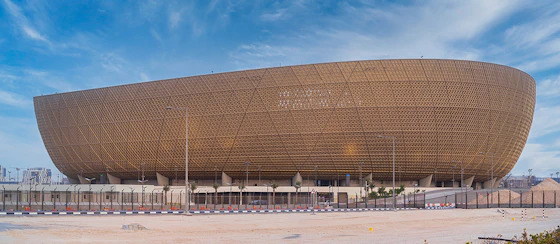In 2022 FIFA claimed Qatar would be the first ‘fully carbon-neutral World Cup’. Analysis showed this was not the case. As the Swiss Fairness Commission said in its officialese, “FIFA was not able to provide proof that the claims were accurate during the proceedings.”

By Dan Magrath, Gold Standard’s Lead for Corporate Best Practice
Nothing captivates public attention quite like global sporting events. This summer the International Olympic Committee (IOC) has also made claims about the climate credentials of the Paris Games, but unlike the Qatar World Cup, these are based on a “contribution approach” offering more credibility and resilience to criticsm. It will be very interesting to watch how these claims respond to scrutiny.
As we move closer to 2050, every big event – and this applies to every organisation as well – needs to align with global net zero efforts, working to reduce emissions created by their operations and supply chains to zero and taking responsibility for the emissions that do occur on that journey. Action is incredibly important, but so is being realistic and transparent.
Pretty much everything we do relies on fossil fuels, one way or another. It is certainly impossible to run a major sporting event without emitting harmful greenhouse gases. But focusing on aligning with net zero efforts is a positive step. Taking responsibility means acknowledging the harm, taking credible actions to reduce it and acting further where that hasn’t been possible. Part of that responsibility is communicating honestly and transparently about what your organisation is doing, what is working and what is not. One of the major issues with FIFA’s claim was that they tried to claim they had achieved carbon neutrality already, despite not being able to support these claims and were thus misleading the public.
So what do we need to think about when it comes to events?
The IOC is using tables made from old shuttlecocks and beds made from cardboard, and only two venues for the Paris Olympics are new builds. However, there will continue to be significant harm in many ways, not least travel to and from Paris, by Olympians and spectators alike.
The result is that the projected carbon emissions from the coming fortnight of sport will be 1.75mt. The good news is this is half that of the Tokyo Olympics. A 50% reduction, if accounting is accurate, over four years is a good result for any organisation and well above what would be expected of organisations applying a science-based target. But we’ll only know how well the IOC are doing overall when we can see the trajectory of emissions over more four-year cycles, further reducing from Paris’ footprint with each successive games.
FIFA doesn’t fare as well. It has estimated 3.6mt of carbon emissions from the 2022 World Cup, though that is probably an underestimate. On top of that, there wasn’t much effort to mitigate emissions, particularly from all the energy used to reduce the ambient temperature in the stadiums. It was also a significant increase from the 2.1mt estimate for the 2018 event, certainly not in line with a net zero journey.
On top of FIFA going in the wrong direction, it also failed to credibly take responsibility for the emissions it did cause. It proudly stated it had offset its flights, though not all operations, but was then criticised for using some poor carbon credit choices. Regardless of the credits used, was there ever any way to convince people a world cup was neutral in terms of its emissions impact? As we said at the time, the time of carbon neutral claims has passed, and we need better ways to take and communicate responsibility. Couple a lofty claim with inefficacy of tool and you have a perfect storm.
On the same issue, the IOC is at least moving in the right direction. It also uses credits but acknowledges them as a slice, rather than the whole cake: “To contribute to carbon neutrality, all organizations must participate in the reduction effort, and can support projects to combat climate change.” This is not perfectly aligned with the guidance of Gold Standard, WWF and Science-based Targets Initiative for unabated emissions, but it is moving towards it.
What else should event organisers do? (And the Olympics might be topical but the same lessons apply to any event, however big or small.)
Measurement is key, using a science-based abatement curve, benchmarking and comparing to previous iterations. If your event is a one-off, you can use benchmark’s from similar events. The central aim must always be a lower footprint than last time. The IOC can play a role by requiring standardised accounting as part of the host application process. Be more IOC, less FIFA.
Keep moving along the trajectory from offset to contribution. The carbon market is a very useful tool to take responsibility for the emissions you can’t abate, but be honest about what it can do. The IOC could set a carbon fee for the hosts to fund further climate action where they exceed the footprint benchmarks set for each games, thus incentivising further innovation.
The Olympics also has a comprehensive overview of sustainability provisions in other areas, such as waste and water use. These are matters related to climate, but more importantly from a reputational perspective any failures in these areas would expose climate claims to greenwashing accusations. The IOC could standardise these thematic areas, aligned with the Sustainable Development Goals, helping to ensure that future games build on best practice and avoid any fatal omissions.
Host and supplier selection should include sustainability actions and targets, including a fee model for exceeding the plan to maintain accountability. Ideally, any fees would be reinvested in mitigation.
And we all need to keep the pressure on event organisers.
The organisers of another big event in this spectacular sporting year, UEFA, appear to have learned from FIFA’s mistakes. It said it wanted the men’s football tournament, Euro 2024, to be a "reference for event sustainability in the world of sports and a driving force for sustainable development for German and European societies." It measured the carbon footprint using GHG Protocol principles, put a range of measures in place to reduce it, took accountability for direct unavoidable Scope 1 and 2 emissions, and mitigated a percentage of their direct emissions through a climate fund.
Looking to the future, women’s football has the opportunity to take the lead, as it has in so many areas. Let’s hope that at Euro 2025 in Switzerland, it can go one better by taking responsibility for 100% of all emissions Scope 3 - those they don’t directly own or control.
In the meantime, I hope you enjoy the Olympics. I know I will.

Connect with Dan Magrath via Linked In Dan Magrath, Manager, Corporate Responsibility
https://www.linkedin.com/in/dan-magrath-85124b10b/

